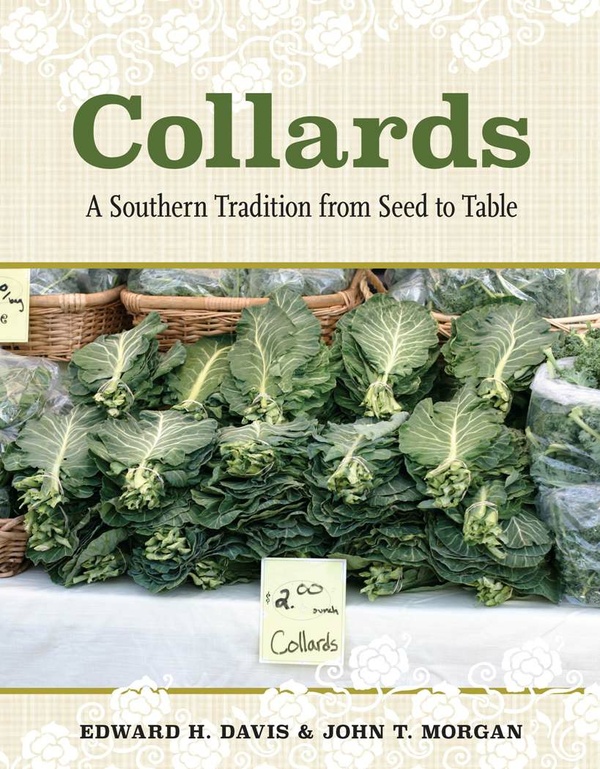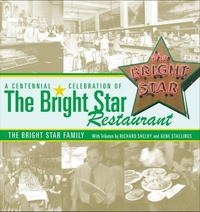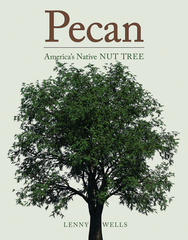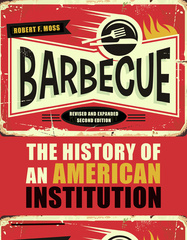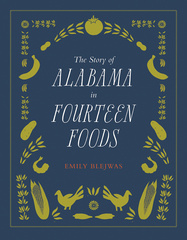Our shopping cart is currently down. To place an order, please contact our distributor, UTP Distribution, directly at utpbooks@utpress.utoronto.ca.
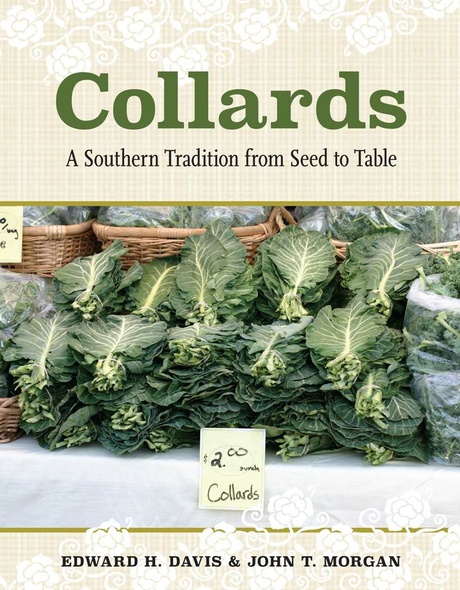
240 pages, 7 x 9
29 color illustrations - 7 maps
Hardcover
Release Date:30 Mar 2015
ISBN:9780817318345
Collards
A Southern Tradition from Seed to Table
By Edward H. Davis and John T. Morgan
University of Alabama Press
Food is essential to southern culture, and collard greens play a central role in the South’s culinary traditions. A feast to the famished, a reward to the strong, and a comfort to the weary, collards have long been held dear in the food-loving southern heart. In Collards: A Southern Tradition from Seed to Table, Edward H. Davis and John T. Morgan provide this emblematic and beloved vegetable the full-length survey its fascinating and complex history merits.
The book begins with collards’ obscure origins. Like a good detective story, the search for collards’ home country leads the authors both to Europe and West Africa, where they unravel a tale as surprising and complex as that of southern people themselves. Crossing back over the Atlantic, the authors traverse miles of American back roads, from Arkansas to Florida and from Virginia to Louisiana. They vividly recount visits to homes, gardens, grocers, farms, and restaurants where the many varieties of collards are honored, from the familiar green collards to the yellow cabbage collard and rare purple cultivars.
In uncovering the secrets of growing collards, the authors locate prize-winning patches of the plant, interview “seed savers,” and provide useful tips for kitchen gardeners. They also describe how collards made the leap from kitchen garden staple to highly valued commercial crop.
Collards captures the tastes, smells, and prize-winning recipes from the South’s premier collards festivals. They find collards at the homes of farmers, jazz musicians, governors, and steel workers. Kin to cabbage and broccoli but superior to both in nutritional value, collard greens transcend human divisions of black and white, rich and poor, sophisticated and rustic, and urban and rural.
Food trends may come and go, but collards are a tradition that southerners return to again and again. Richly illustrated in color, Collards demonstrates the abiding centrality of this green leafy vegetable to the foodways of the American South. In it, readers will rediscover an old friend.
The book begins with collards’ obscure origins. Like a good detective story, the search for collards’ home country leads the authors both to Europe and West Africa, where they unravel a tale as surprising and complex as that of southern people themselves. Crossing back over the Atlantic, the authors traverse miles of American back roads, from Arkansas to Florida and from Virginia to Louisiana. They vividly recount visits to homes, gardens, grocers, farms, and restaurants where the many varieties of collards are honored, from the familiar green collards to the yellow cabbage collard and rare purple cultivars.
In uncovering the secrets of growing collards, the authors locate prize-winning patches of the plant, interview “seed savers,” and provide useful tips for kitchen gardeners. They also describe how collards made the leap from kitchen garden staple to highly valued commercial crop.
Collards captures the tastes, smells, and prize-winning recipes from the South’s premier collards festivals. They find collards at the homes of farmers, jazz musicians, governors, and steel workers. Kin to cabbage and broccoli but superior to both in nutritional value, collard greens transcend human divisions of black and white, rich and poor, sophisticated and rustic, and urban and rural.
Food trends may come and go, but collards are a tradition that southerners return to again and again. Richly illustrated in color, Collards demonstrates the abiding centrality of this green leafy vegetable to the foodways of the American South. In it, readers will rediscover an old friend.
Historically and culturally, collards matter. As sustenance and sacrament, as meme and totem, this leafy green has long served the American South and its peoples. Rooted in geography, but ranging smartly through complementary fields, Ed Davis and John Morgan deliver a book that quotes a wide range of sources—from novelist Zora Neale Hurston of Florida to seed-saver Charlie Malone of Alabama—while exploring collard origins, adaptations, and diffusions.’
—John T. Edge, author of Southern Belly: A Food Lover’s Companion
Underrepresented, underappreciated, undervalued, collards have long deserved a focused book. Davis and Morgan serve up a delectable account of collards that stands as the definitive treatise on the topic. Collards is an admirable account of the natural and social history of the plant and its role in southern food culture.’
—Steven L. Hopp, coauthor of Animal, Vegetable, Miracle: A Year of Food Life
Right now, I am enjoying a new book from UA Press, Collards!! I grow collards, eat collards, and now I read collards! How much better can life get?'
--Larry Clayton, retired historian and guest columnist for the Tuscaloosa News
'If you ate collards as a youngster but then drifted out of the South, Collards will allow you to rediscover an old friend.'
—Montgomery Independent
Edward H. Davis is a professor of geography and the chair of the Geography Department at Emory & Henry College and coauthor of The Virginia Creeper Trail Companion: Nature and History along Southwest Virginia’s National Recreation Trail.
John T. Morgan is a professor of geography at Emory & Henry College and author of The Log House in East Tennessee.
John T. Morgan is a professor of geography at Emory & Henry College and author of The Log House in East Tennessee.

